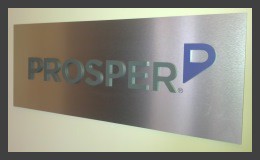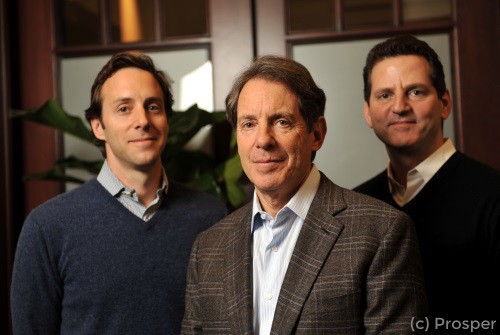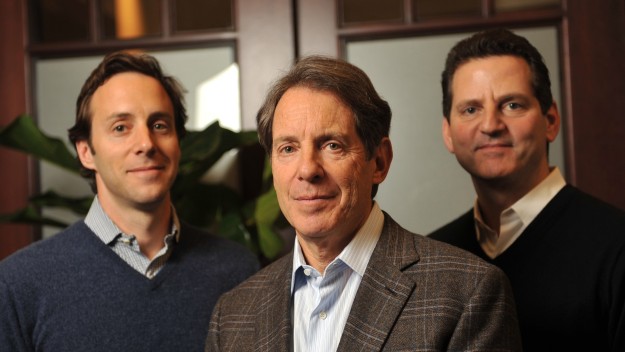“We celebrate it,” says President Aaron Vermut.
Yesterday I flew to San Francisco to sit and talk with the management of Lending Club and Prosper. These peer to peer lending companies, the only two in the United States, reside almost next door to each other in the city’s financial district, so visiting both in one day was a refreshingly simple feat (read my interview with Lending Club here).
I had come to visit Prosper for a couple reasons. First, the management was completely new, with a brand new president and CEO, so I was curious how they were differentiating themselves from the previous team. Prosper had run into rough waters last fall, experiencing a dramatic drop in their amount of monthly funded loans. I was hoping to hear an update about the company’s efforts to turn things around, especially since April was marked by much welcomed growth.
Second, I was eager to hear Prosper’s response to the recent investment in Lending Club by Google, a $125 million purchase that newly valued Lending Club at $1.55 billion. I did not fully understand what particular benefit Google received by buying a place at Lending Club’s table, and was hoping Prosper’s team could provide that insight.
I arrived at 111 Sutter Street and entered the building. Stepping into an elevator, I was surprised to see that the button for the 22nd floor had already been pressed. As the doors slid shut and the elevator began to ascend, I turned around and was greeted by a younger guy wearing tinted wraparound sunglasses. “Going to Prosper?” I asked him. He nodded. I asked what he worked on, and he kindly replied (with a thick accent) that he worked in data. “How classically San Francisco,” I thought to myself. “My first elevator in the city, and I happen to meet a skilled foreign programmer.”
 The elevator opened and I was greeted by a large white door adorned with a punchy metallic plaque of Prosper’s logo. I was pretty excited. I had been writing about peer to peer lending for nearly four months non-stop, and here I finally was, stepping into the office of one of these companies.
The elevator opened and I was greeted by a large white door adorned with a punchy metallic plaque of Prosper’s logo. I was pretty excited. I had been writing about peer to peer lending for nearly four months non-stop, and here I finally was, stepping into the office of one of these companies.
I greeted the secretary, who invited me to take a seat. A few minutes later, Ron Suber, head of institutional sales, came out and greeted me warmly. He brought me to a conference room, got me a soda and left to fetch the others. As he left the room, I couldn’t help but glance out the glass door. Long lines of desks were filled with people quietly working. The space felt focused.
The door opened again, and in stepped Aaron Vermut, president of Prosper. Aaron greeted me and sat down at the table. He was younger than I had imagined, but I suppose this is normal for San Francisco. I started by mentioning his recent Prosper blog posts, specifically how much I appreciated his willingness to engage comments on that forum, a welcome change from the previous president. Aaron spoke about the quality of the discussion, about how pleased he was with the respectful dialog that had happened in a typically volatile environment like a blog forum.

President Aaron Vermut, CEO Stephan Vermut, & Head of Sales Ron Suber
Honestly, I immediately liked Aaron. He came off as intelligent and sincere. Considering the tough work on his plate, I was happy with how little grandstanding or subtle worry I heard in his voice, something that executives can evoke when they feel at risk. Instead, he felt focused.
I began by referencing an interview that Stephan Vermut, Aaron’s father and the current CEO, did with Lend Academy in February. Stephan had mentioned a 100-days campaign that new transitions often start with. Beginning the discussion, I said, “During that interview in February you mentioned a coming period of one hundred days. Peter wrote how your team had just come on, that you had just arrived and were figuring it out. Now it’s now been…”
“…one hundred days,” he finished thoughtfully.
“Yeah, the 100-day campaign,” I said. “Would you mind talking about that a bit?”
Aaron began: “Well, we are really happy with how far we’ve come. For better or for worse, we replaced the existing management team. A lot of the 100-days campaign was around wanting to change the culture at Prosper. We wanted to establish a bit more of a professional environment, and create excitement about the business and everything that is happening.”
He paused, choosing his words carefully. “Relative to the previous management team, just the fact that we show up every day and work hard has had a big effect. We changed the dress code and push hard, working harder here than everybody else. We hired a new CFO and replaced the head of sales with Ron. We’ve got a lot done, putting the bankruptcy remote in place. We updated the credit policy…”
“… and the new overlay of the website,” I said.
Vermut paused. “You know what was amazing?” he said. “That was just sitting on the shelf. Within the previous management team, nobody wanted to make the decision, so we just said, ‘Let’s go with that’.”
“Overall, we wanted to make a change. There is a really really big difference in the culture here from the previous managements.” Aaron stopped and clarified why he made ‘management’ plural. “I’m not going to single any one group out, because this company goes back a while.”
What he said next really intrigued me.
“You know, this was a high flier venture capital funded business which I think…” he paused and softened his voice, “spent way too much money on everything it did.”
“In comparison, our team comes from a much more capital-constrained business that we funded ourselves. We then raised venture money, one round, and got the business to profitability. At our previous business I signed every check the company issued over an eight year period, and our revenue was way bigger than Prosper. We had over a hundred people there.”
“So now at Prosper, we are really focused on the details. We are very expense conscious. Not only have we increased the loan volume by over 100% but we have also cut the burn rate. In April we already cut it by 30%. We are going to be more profitable than our cousins were,” he said, referencing Lending Club, “and at a lower amount, because we are charging full fees to everyone, not making exceptions. We consider ourselves a pure platform,” he said, stressing this point. “We are charging everybody the same. We’re not going to advantage anybody over anybody else because we want Prosper’s platform to be fair. I think the way others have done it previously is that they gave special deals to volume.” This was a reference to Lending Club’s LC Advisors.
“We’re going to do the opposite,” he said. “There’s no need for anybody to fear that anybody is getting a better deal, because this is the only way we’re going to charge people. Consider us a platform or an exchange; everybody pays the same.”
“Talk about the new reevaluation of your credit model,” I said.
“Josh Tonderys, who came on in the fall, basically rewrote the whole thing. What we found was that the previous management’s credit model… (another careful pause) it’s almost like it had started to drift. The expected versus actual [return] was drifting away, and they were not iterating to keep up with it. Our new credit policy is six months old and it’s already looking really good. The returns are tracking nicely and the losses are way lower than they were before.”
Ron Suber indicated that Aaron’s time with me was short, so I got to the main question I had been waiting to ask, inviting him to respond to Google’s recent $125 million investment in Lending Club.
“We celebrate it,” Vermut answered.
He continued. “I think it is really interesting that it was Google Corporate and not Google Ventures. They’re probably interested in this future foray into small business lending…”
This was interesting. I interjected, “You think small business lending is tied to Google’s investment?”
“Could be,” he replied, thinking. “If people are not doing more than $50,000 a month in Adsense (Google’s publisher program) they can’t use an invoice account, so they put the charges on their credit card. What better way to fund a business Adsense account than to take out a Lending Club loan, put it on your account and draw down from that?”
Aaron continued, “I think the [$1.55 billion] valuation is a little crazy. As a venture guy myself, it does not make dollars and cents in regard to where Lending Club is in their business model, but I think Google and others are looking at the platform more than the revenue. They see the platform as the opportunity.”
Summarizing his thoughts, Vermut said, “Regarding Google’s investment, I think it is a great validation of the space. We’re really happy for those guys. We think there is an unbelievable market and it is not even the first inning. We think it’s spring training.”
I thanked Aaron Vermut for his time. He shook my hand and wished me well before being whisked away to another meeting. I walked out the doors of Prosper’s lobby. Back in the elevator, I took a moment to reflect on the interview.
First, I was interested by the desire of Stephan & Aaron Vermut and Ron Suber to distance themselves from Prosper’s previous management. I had not previously realized how truly different Prosper was from a year ago. It had basically become a different company. I left the interview feeling like Prosper was both thrilled and relieved by the recent success it had in March and April, that perhaps a lean and mean group like Stephan, Aaron and Ron are what is needed to stop Prosper’s burn of cash and become a profitable company.
Second, when Aaron used that baseball metaphor about peer to peer lending’s growth being “not even the first inning”, I knew he was right. There is unparalleled potential for growth within peer to peer lending; its only constraint is the national population.
Exiting the elevator onto the street, I thought about the foreign programmer in the elevator, the tables of focused employees, and the palpable resilience I felt from Aaron as he spoke of deconstructing and reconstructing Prosper. Taking everything into account, I could not help but be inspired by what I had seen.

The advertiser program is AdWords not Adsense (Adsense is the publisher program)
Thanks, updated.
Thank you for your great interview simon. Really good. Thanks for taking the time. Cheers, John
Great opportunity to interview. Enjoyed hearing something unique!
I’m a upper midwest native from the days when all my friends and school mates looked like me. I’m now in the Pacific NW at a large software company based in Redmond. Tons of my coworkers have accents as well as US nationality. The post is interesting, but the bigotry implied by your comment about accents is not appreciated. It’s enough to make me want to unsubscribe from your RSS feed.
Hi Frank, I apologize if you found my comment about their foreign employee derogatory. I think I could have written that better. In no way was I trying to demean him because of his accent, or say that he wasn’t an American citizen or something. I was only saying that the hiring of skilled foreign programmers is typical of fintech startups (because US programmers are often less skilled!), and that my experience at Prosper confirmed this.
My mom has an accent and is a US citizen :)
Thanks, Simon – great interview and interesting to hear the commentary around the Google investment.
Hi Tom! Thanks for stopping by.
Thanks for the informative article! I am a prosper lender so I definitely have an interest in seeing this company flourish. It’s great to get a look into the new management and see that they are a successful team and are breathing new life into this business.
Your comments about the new management team at Prosper are encouraging. Here, in Pennsylvania, Prosper is not available even via Foliofn. The next time you speak to the Prosper team find out when that is going to change.
Thanks Mike!
Good to see the “we are charging everyone the same” approach. I’m not too impressed with Prosper at the moment but I think it is good for the business that there are two big players available. This makes things more favorable to investors and borrowers. Curious to see if Prosper overtakes Lending Club soon. Similar to how the Blackberry and Iphone got dethroned when they stopped innovating. Great article!